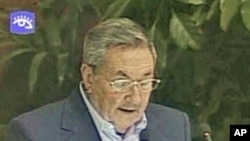The United States and some European nations are increasing pressure on Cuba following the death of a prominent dissident during a hunger strike. Cuban President Raul Castro first expressed regret at the death of Orlando Zapata Tamayo. But now he is firing back, accusing adversaries of taking advantage of the situation.
Cuban leaders have long defended the nation's human rights record from critics in the U.S. and Europe. President Raul Castro, however, said the latest round of criticism is akin to blackmail.
"We will never yield to blackmail from any country or group of nations, no matter how powerful they are," said Raul Castro.
The death of jailed dissident Orlando Zapata Tamayo sparked criticism of Cuba by U.S. and European leaders. Zapata Tamayo fasted for more than 80 days to press for better jail conditions.
At a Communist Youth congress, Mr. Castro said foreign critics are using the death to launch a new media campaign against Cuba.
"They are cynically manipulating the death of a person jailed for common crimes," he said.
President Obama has said Zapata Tamayo's death was tragic, and he called for the release of all political prisoners in Cuba.
Other dissidents have launched hunger strikes including Cuban journalist Guillermo Farinas. He says he will refuse food until the Cuban government releases 26 political prisoners said to be in poor health.
U.S. officials also are concerned about a group called the Ladies in White, made up of wives and relatives of jailed dissidents.
Gordon Duguid is acting deputy spokesman at the State Department:
"We're concerned about the welfare of the Damas de Blanco and dismayed that a peaceful march was disrupted by the Cuban government authorities who interfered with the right of Cuban citizens to peacefully assemble and express their support for their family members who are prisoners of conscience," said Gordon Duguid.
Last month, Cuban-Americans and other Miami residents held a march in support of the Ladies in White. At the same time, in Havana, the Ladies in White tried to march but police intervened.
Pro-democracy groups say anti-government sentiment is spreading, partly because of the death of Zapata Tamayo. Recent protests have been reported in areas outside Havana.
Marcibel Loo monitors human rights in Cuba for the Cuban Democratic Directorate, a pro democracy group in Miami.
"We are seeing every day that people are not willing to cooperate with the regime," said Marcibel Loo. "So they [the government] have had to conduct beatings and arrests and sacrifice their image to try to control them."
Loo says the crackdown is not a result of pressure from the White House, rather it's is in response to domestic problems.
"With the marches that are going on not just in Miami, but Los Angeles, and New York, Spain and Brazil, it is tying the Cuban exile community to people on the island," she said. "And that is something new."
Pro-democracy activists like Loo hope pressure inside and outside the island will yield change in Havana.
But for the moment, it's unclear how things will play out.




